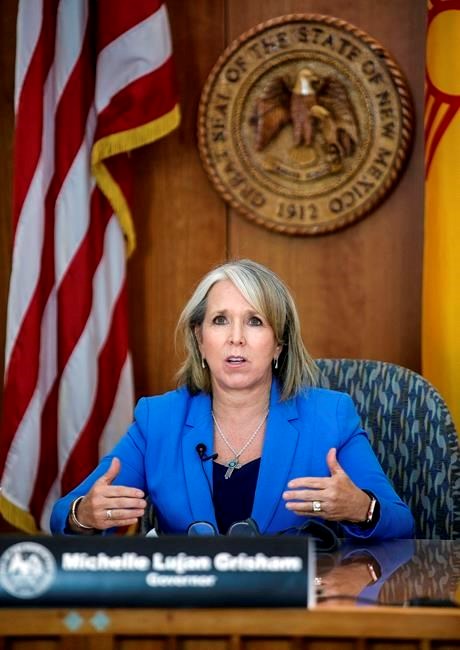ALBUQUERQUE, N.M. — New Mexico Gov. Michelle Lujan Grisham announced Tuesday she will renew public health restrictions and warned that more stringent rules could be imposed because of a rise in COVID-19 cases.
The updated regulations will take effect later this week. They will include limiting gatherings to five people or less, a mandatory 14-day quarantine for visitors from states deemed high-risk, reduced hotel capacities and a 10 p.m. closing time for food or drink establishments serving alcohol.
Lujan Grisham said the virus is spiking in New Mexico right now and that the state has experienced some of the worst increases in the U.S. so far this fall. Without a vaccine, she said officials have only a few tools to fight the virus — such as making people wear masks, staying home as much as possible and avoiding groups of people.
“This kind of overwhelming and dramatic statewide spread signals one thing: Too many of us, succumbing to COVID fatigue, are no longer using those tools,” the Democratic governor said. “We’re no longer taking those precautions. We are giving the virus too many opportunities to spread.”
State health officials have reported more than 33,710 cases since the pandemic began, with 355 cases added to the tally Tuesday. Officials have said 918 residents have died.
New Mexico lost ground with its efforts to contain the spread of COVID-19 as newly reported daily infections hit a record of 488 last Friday. That was followed the next day by 486 cases. The high numbers have continued in recent days.
The state for several weeks has missed benchmarks set by health officials for reopening, including virus spread and positivity rates and daily case totals. Hospitalizations also have increased.
Lujan Grisham said New Mexico is fast approaching the point when community spread of the virus becomes uncontrollable and the only option is to shut down opportunities for the virus to spread.
“Rollbacks will mean more economic turmoil for so many workers and business owners in our state who have already suffered and sacrificed so much,” she said. “But it is our only chance to prevent more devastating illness and to save lives. No one wants to come to that point.”
Without improvements, the governor's office said the state will again restrict indoor dining service and roll back maximum occupancy allowances at other retail and dining establishments.
Steve Pearce, chairman of the state Republican Party, criticized the governor's latest announcement as haphazard and illogical.
“Such arbitrary changes won’t fix our state’s problems — our drowning economy, lost jobs, lost revenue — or get students back to classes any sooner,” he said in a statement.
As for the early closing times that will be mandated for establishments that serve alcohol, the governor's office said other states such as Kentucky, Ohio, South Carolina and Washington have imposed similar limits on operating hours. New Mexico officials promised rigorous enforcement.
Under the new rules, hotels will have their maximum occupancy reduced from 75% to 60% for those that have completed state virus prevention training. For those that haven't, the occupancy rate will be reduced to 25%.
The state previously had loosened the rules for gatherings, but the changes mean the limit will be reduced again to no more than five people. It will apply to public and private gatherings, including organized events and sports.
The governor is expected to discuss the revised health mandates Thursday during a public briefing.
In Albuquerque, city officials on Tuesday announced a new program to supply local businesses with personal protective equipment and COVID-19 screening supplies. The city plans to spend more than $1 million on the effort.
Susan Montoya Bryan, The Associated Press



